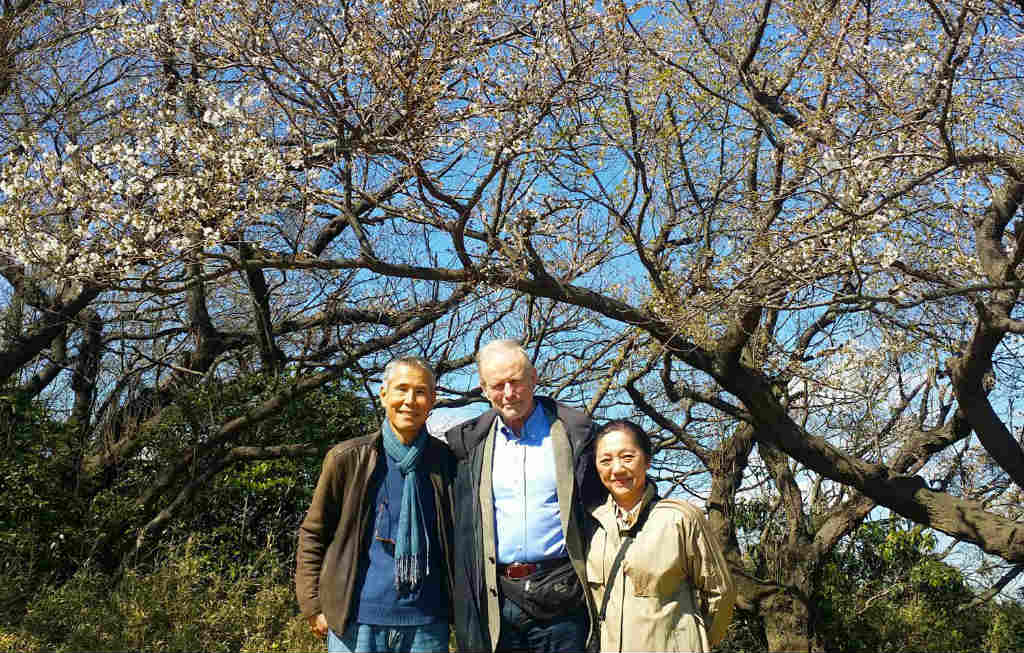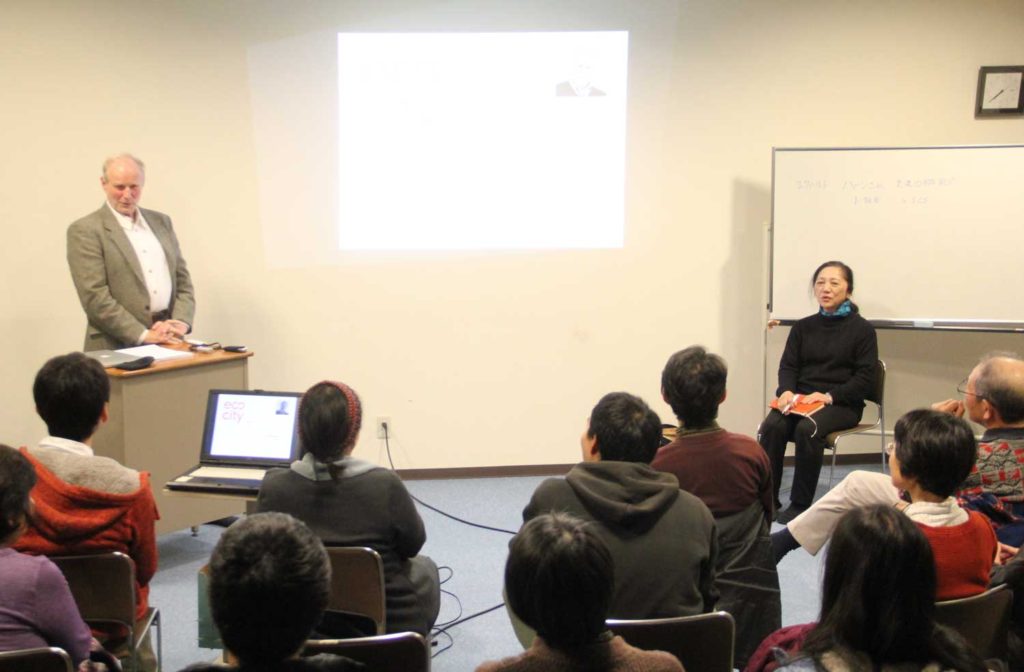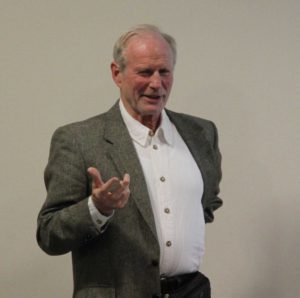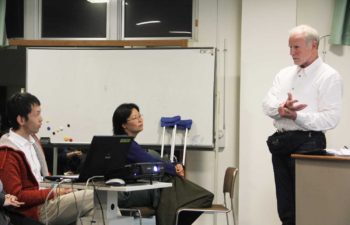Interview with Professor Hahn
Why I have been visiting to observe AsOne Community for ten years.

"Sustainable City and People
IntroductionIn March 2019, Prof. Ekhart Hahn from Germany visited the As One Network Suzuka Community (hereinafter referred to as the As One Suzuka Community). As One Suzuka Community has been trying to manifest a sustainable urban community as a social experiment since 2001. Prof. Hahn is a pioneer in the study of eco-friendly urban planning known worldwide for many pilot projects. Even though he is at the age of 77, his challenging work keeps attracting attention from lots of professionals.
By the time he visited this community in 2009, there were no landmark buildings that stood out. After his first study tour of As One Suzuka Community, he gave advice on setting up the Eco Station, following Suzuka Culture Station, which remodeled the existing furniture exhibition hall, was opened in 2010. The concept of eco station is one of his research results. In other words, it is intended as a nodal point for local residents, information and practice of creating new societies to meet and expand understanding of sustainability without hardship.
March 26th to April 6th in 2019, GEN(Global Ecovillage Network)-Japan had a lecture series with him; "Ecomotion of Creating a New Eco-village for the Survival of Humanity" . During the series, As One Community celebrated the 10th anniversary of opening Suzuka Culture Station and friendship with him. And the Professor gave the memorial presentation.
From the point of view of manifesting a sustainable society in future, as introduced by the professor, the As One Suzuka community has many untouched issues. Nevertheless, why is he still interested in this social experiment?
Hiroko Katayama, a president of GEN-Japan, interviewed him right after his commemorative lecture.
Important Issue---To Focus on Humanity
 Hiroko Katayama:
Hiroko Katayama:Thank you very much for the introduction of the Wunsdorf Project. I think it is your most characteristic suggestion that focusing on humanity is a key issue in achieving a sustainable society. In particular, the concept and practice of "Eco Station" is unique, that comes from your research and practice for long years. And here Suzuka Culture Station is the first place based its philosophy in Japan.
Well, since 2009, you have been on staying at and observing As One Suzuka community each year, and why do you keep so much attention to this small community? Could you tell me why?
Professor Hahn:
Thank you, Hiroko-san. I am very happy to answer this question. I have been coming since ten years ago, nearly every year. I think As One Community is the extremely interesting social experiment. I am working at Sustainable urban planning that means future cities will be cellular. There are lots of aspects to implement for that, and human aspect is very essential that we can see at As One Community experiment.
 They are the most interesting group I got to know ever, because they brought their new ways with new ideas into the urban atmosphere. And it is exciting for me to see and follow such social experiment, which is developing year to year, And with new experience and new ideas that is really interesting.
They are the most interesting group I got to know ever, because they brought their new ways with new ideas into the urban atmosphere. And it is exciting for me to see and follow such social experiment, which is developing year to year, And with new experience and new ideas that is really interesting. Through such my own observation, I found the most important thing is human side. It is a community with more than hundred people, and the atmosphere between these groups is extremely friendly and very positive, and so they can try many experiments. Not of all are successful, and some fails. But also important how this group is what/how they are dealing with new ideas which first approach was not successful. In everyday life, they are doing lot of interesting things.
A Challenge of Society and Economy for Human Happiness
My most impressive point is their successful urban agriculture according to ecological and biological ideas. It is not only successful as social side but also economical side. They have been farming in urban sphere as well as processing in their innovative company, which I think it is totally new. In their company they work together without hierarchy, with much more happiness. That is very important approach. It is not only the facts what they are doing, but a way, human way. That is the big challenge. And as far as I can follow these experiments, they are very successful They have also started an Academy and Network building, nationally around Japan and internationally with Korea and Brazil. Many young people are coming to ScienZ Academy to learn As One experiment. And as far as I can see only two places, it works under each condition of Brazil and Korea. So it is an approach, one of others challenging in the world, how to organize the post-modern or post fossil society in new way. And not only from social dimension and economical one, at least agriculture sphere also from ecological side, all of them have been going step by step. That is why I am coming from year to year. Always new ideas and new experiments are very alive in this group. And very open also to other ideas, so it is not closed community but open one.
They have also started an Academy and Network building, nationally around Japan and internationally with Korea and Brazil. Many young people are coming to ScienZ Academy to learn As One experiment. And as far as I can see only two places, it works under each condition of Brazil and Korea. So it is an approach, one of others challenging in the world, how to organize the post-modern or post fossil society in new way. And not only from social dimension and economical one, at least agriculture sphere also from ecological side, all of them have been going step by step. That is why I am coming from year to year. Always new ideas and new experiments are very alive in this group. And very open also to other ideas, so it is not closed community but open one. Five Minutes City
And this year I and you, GEN-Japan, and As One Suzuka members visited at Suzuka city hall to have a meeting with a superintendent of Suzuka Educational Department, and the atmosphere was so friendly. That meeting is quite cooperative, and community is open for their ideas.That meets again my question concerning new cellular structure of cities, because this community is based on a cellular structure so, their production and social activities and their living is inside, we call it five-minutes cellular or city , so you can buy something by walking or bicycle, everything is connected each other in urban areas.
That is a big step. So yes, in many aspects, the community is interesting, and also people I met, most of them I have known very well since fifteen years ago, and we keep very friendly atmosphere between us, with open discussions not only about positive side of project, but also the sights which are not so successful, and which have to be developed. Such thing is not very often with other groups. Because mostly project is only talking about positive side, but not open critical sides. This is also a point which I don't find everywhere, such an open way. So yes, I am very happy, having the chance of opportunity to follow of this experiment, this group which I really think one of the most interesting I got to know in my life. I enjoy a lot.
ScienZ Method for Younger Generation
Hiroko:Thank you, professor. We have still some time. And then I would like you to summarize in short again; what is your strongest impression on this project for ten years?
Ekhart:
What is most impressive idea I experience I got to know here?
OK, but it is not so easy to answer. I told already many aspects before.
I think it is interesting this year I met many young people, and also international people coming from Brazil, Korea, beside Japanese young people who joined Academy of ScienZ, which is a method of learning for general people as well as a theoretical and methodological base of the project. What I found interesting is these young people get lot of orientation by this method. I know a little about ScienZ, Theory of ScienZ Method. And it is an interesting approach.
However theoretically there are many approaches in the world. What are different from other approaches? I had feeling after the discussion with young national and international people, that this method gives orientation to them, they feel stronger to find themselves and find their position, and they are creating new type of sustainable society. So this is something that speaks for this theory.
I have also discussion with Ono-san and with Sakai-san who are very much developing this theory and method, we had discussions about it for many years. I see also how the method developed and partly I can see how it functions because also structure of this community, which is always a little changing, So it is not dogmatic, always flexible and changing, new experience, it is also possible to integrate theory and the method of ScienZ, And I see how Joy System is permanently changing and developing.
I see it with Bento Company that seems to me. It is the most interesting for me, even I haven't really understood the change, that a wonderful person who was really developing the whole concept, such person left because he is very influential and came a kind of hierarchy in the company, very successful company, now he left to develop himself more personally but also to give room for others, young people.
Openness and Flexibility
In As One Suzuka Community, it seems that younger generation takes over the responsibility of the company as well as the community. It will be very interesting how it functions and how they change the structure of the community. If it keeps successful--, so many open questions cannot be answered yet, but the interesting thing for me is that the system is open for change, not fix, keep flexible alive.I wish As One Community to go on this present way to be really open and flexible. Because when we create new structures for sustainable future, we need this kind of flexibility. And also in the discussion with community members, it was clear that many aspects are still on the background, which is important for sustainable future, but that is very understandable.
Because it needs steps, anyone cannot do everything at once, and so they have set priorities at the moment. It is very clear, but of course, to create really sustainable future needs also some aspects which will come, which are now not so much foreground, that is the question of really development step by step to go on this creative process.
Hiroko:
Thank you, I was much honored to have such comment from you.
Ekhart:
It's my pleasure.
In As One Community
April 2nd, 2019.
